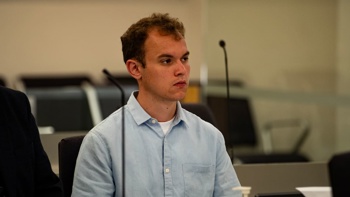

A teen stepmother continued to deny killing her partner’s 2-year-old daughter as she was jailed for her death today.
Jessica Lee Rose Mulford was found guilty of manslaughter last year in the High Court at Hamilton at a trial into the death of Harlee-Rose Niven.
She was also found guilty of injuring with intent to injure after strangling the child five months before she died, in Tauranga, in April 2022.
Harlee-Rose died of “catastrophic” abdominal injuries in Waikato Hospital after Mulford found her unresponsive and blue in her bed.
The Crown claimed Mulford killed the toddler after she “snapped”, having built up resentment at having to take over the shared full-time care with Harlee-Rose’s father, Dylan Berry.
 Jessica Mulford pictured in the High Court at Hamilton during her trial. Photo / Belinda Feek
Jessica Mulford pictured in the High Court at Hamilton during her trial. Photo / Belinda Feek
However, the defence argued Berry was also home that morning, and the toddler had several other accidents — including while on a magic carpet ride — that left her bruised in the days leading up to her death.
Mulford was back in court today before Justice Neil Campbell for sentencing.
The public gallery was packed with whānau of both Mulford and Harlee-Rose, including the youngster’s father, Dylan Berry, and mother, Paige Niven.
Distraught family members described the devastation of losing the bright and bubbly girl.
Niven said she let out the “loudest scream” at the hospital when hearing the news that her daughter had died.
“I cried. I wished nothing more than to bring her back. Her life had just begun.”
She said Harlee-Rose “no longer looked like my precious little girl” when she saw her lying in her coffin.
“She was bruised head to toe, including two black eyes.”
Her death had left her suffering nightmares and flashbacks of her daughter being battered.
“I feel so broken without my little girl.
“Harlee-Rose was the light of my life. Harlee-Rose knew how to make me smile.”
 Dylan Berry with his daughter Harlee-Rose. Photo / Supplied
Dylan Berry with his daughter Harlee-Rose. Photo / Supplied
Crown solicitor Rebecca Mann acknowledged Mulford was young at the time of the killing but submitted at that time she had already strangled the toddler.
She urged Justice Campbell to make that distinction when assessing her culpability and pushed for a starting point of seven to eight years in prison.
Acknowledgment of prospects of rehabilitation should also be limited as Mulford still denied killing the little girl, Mann submitted.
Defence counsel Rebekah Webby urged the judge to recognise Mulford’s age and lack of parenting experience.
She denied her client lacked rehabilitation prospects, and said she had completed a course while on bail awaiting trial and had made good progress in prison.
Webby submitted she should receive discounts for her age, background and drug use.
Justice Campbell said while the cause of Harlee-Rose’s death had been determined, the mechanism remains unknown.
“But it is consistent with stomping, kicking or punching”, in such a severe way that it split her pancreas in two, lacerated her liver, and would have left her unconscious within minutes.
He took into account that immediately after it occurred, Mulford sought help from Berry who was outside the house at the time. They tried CPR before rushing her to the hospital.
While Mulford offered several alternative explanations for Harlee Rose’s death, the jury ultimately didn’t accept any of them but fell short of finding her guilty of murder.
Justice Campbell said she inflicted serious violence against the toddler, saying the force required to kill her “must have been high”.
He took a starting point of seven years imprisonment before issuing discounts for a psychological report and her lack of parenting skills and young age at the time.
“You were just 18 years old. This does not provide any excuse for your offending but the Sentencing Act requires me to take that into account.”
That was due to research showing the frontal lobe of young adults was yet to fully develop, leaving them lacking impulse control.
He issued a total of 20% in discounts before arriving at an end sentence of five years and seven months.
Belinda Feek is an Open Justice reporter based in Waikato. She has worked at NZME for 10 years and has been a journalist for 21.

Take your Radio, Podcasts and Music with you









